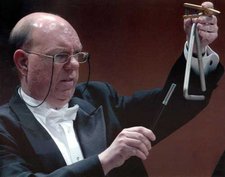Last week, Maribeth and I had the opportunity to attend an orchestra concert at Carnegie Hall that we enjoyed very much. During one piece, I noticed one of  the performers in particular. He sat on a stool in the corner of the back row along with the other percussionists. However, for most of the song he did nothing. Finally, his moment came and he picked up his triangle and struck it several times in rhythm. It lasted for but a few measures of the lengthy song, and just as soon as he had started – the piece was finished.
the performers in particular. He sat on a stool in the corner of the back row along with the other percussionists. However, for most of the song he did nothing. Finally, his moment came and he picked up his triangle and struck it several times in rhythm. It lasted for but a few measures of the lengthy song, and just as soon as he had started – the piece was finished.
In contrast, the percussionist in the center of that top row had five timpani before him. His part began in the first measures and lasted throughout the song until its thunderous conclusion. He was responsible for producing the percussive foundation for every other instrument that was being played. You could not help but notice him as his arms rose high above his head and the mallets came crashing down rapidly. At some points, his arms appeared as just a blur, and the sound of the drums hit you in the chest (even in the balcony). Others in that back row had bells, snares, cymbals, and even a gong.
And on the end was the tiny triangle. “Ting, ting, ting…”
One of the things you’ll discover is that percussionists interchange instruments for different pieces. The performer who begins on the bells may smoothly transition to drums or cymbals on the next song. So, our overlooked triangle ringer was fully capable of performing skillfully on any of the other instruments, and did so throughout the night. But for that one piece he had what was arguably the least important job of the entire orchestra. (I apologize to anyone who only played triangle in your school’s orchestra.) Perhaps overlooked and underappreciated.
But not by the composer.
As he crafted the music, a concept was in his mind. He labored expertly to transfer mood to melody, convey ideas through tempo and rhythm, and voice emotions in instrumentation. For the composer (and later, the conductor) each part for each instrument is important. If it is missing (or performed thoughtlessly or with little effort) the entire piece suffers. The music does not accomplish what the composer intended.
And so it is in our Christian walk and ministry for the Lord. He is the one who calls us and assigns our parts. He equips us and instructs us. He is the One with a plan to accomplish His purposes. He adds us to His church and orchestrates our service.
Sometimes, that includes work that is full of flourish and fanfare. It is recognized by almost everyone, and we receive heavy doses of appreciation and thanks. Other times, it is a job that is noticed by only a handful of people, and esteemed by even fewer. We feel like an overlooked and underappreciated triangle player in an orchestra.
A few biblical thoughts should help us with this. First, in everything we do, our service is ultimately done toward God. Second, He never misses even the least aspects of ministry done for His sake. Third, He is the great rewarder. Finally, although the job may seem insignificant, it can be a part of His masterplan for our lives, His church, and its work on this earth.
Colossians 3:23–24 And whatsoever ye do, do it heartily, as to the Lord, and not unto men; Knowing that of the Lord ye shall receive the reward of the inheritance: for ye serve the Lord Christ.
So, if all you have to offer is a cup of water, share it with someone in the name of Christ. If your audience is just one person or a full stadium, give them the Gospel with prayerful enthusiasm. If you serve “behind the scenes” while others labor in the spotlight, do it for the Savior’s sake, and know that He is pleased.
If all you find to play is a triangle…Ring it with all your heart!